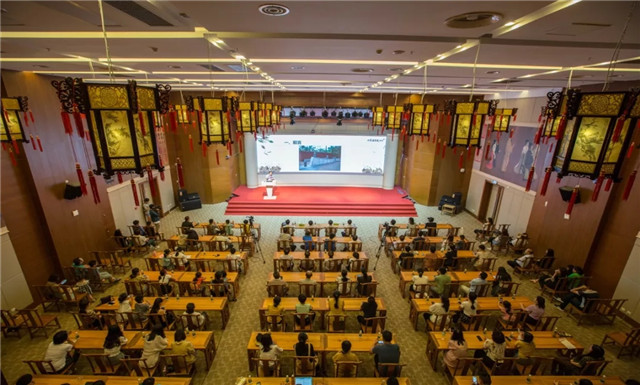Confucius’s “Si Wu” of today’s modern society revealed
Pingtan Net | Updated:2019-08-21
“A boy ran into four monkeys on his way to school one day. Instead of finding this rather peculiar, the simple boy found the incident more amusing. He brushed something aside as irrelevant and should eventually be forgotten. The boy grew older and déjavu struck. He read about ‘Si Wu’ or ‘Four Thou Shalt Nots’ from The Analects of Confucius, the four taboos of Confucianism: see no evil, hear no evil, speak no evil, and do no evil, and immediately the scene of the ‘four monkeys’ popped up. Coincidental? Maybe?” Dung Chin-Yue, emeritus professor from Taiwan’s Chengchi University, also the little boy in his story, opened his speech on August 20 at the Cross-Straits Center of Guoxue in Pingtan with the same incident he once thought was irrelevant.

At the scene of the 13th Guoxue lecture
Dung noted that to grasp the meaning of “Si Wu” or “Four Thou Shalt Nots”, we must first get to know the terminology “propriety”. The Commentariology defines “propriety” as “taking human feelings into consideration”, “conforming to reasons and norms” followed by “making it happen”.
To make it clearer, Dung exemplified: “In ancient China, sons and daughters mourn the demise of their father for 3 years and 1 year for their grandfather. Judging on propriety, the grandfather who is an elder in the family and also a higher member in the family hierarchy should be mourned longer, however based on relationship and degree of intimacy with the sons and daughters, the father far surpassed the grandfather. Either way, whether it is following propriety or affairs of the human heart, it can be counted as “observing propriety” only when they are honored and followed.

Prof. Dung Chin Yue
Dung pointed out that unlike in traditional society where “propriety” was more prevalent, the modern society today is governed by “law and order”. In fact, both are intertwined closely and can complement each other very well.
Nevertheless, “Four Thou Shalt Nots” still resonate in today’s modern society. “Once, Confucius relates filial piety back to proprieties when he said that giving offspring is propriety, burying the dead is propriety and remembering the dead is propriety. In other words, children should wait on their parents when they are alive, bury and remember them after their passing. This is propriety and filial piety. Filial piety is still the cradle of humankind. The Chinese still keeps filial piety and propriety alive by observing traditions like sweeping the tombs of their loved ones and paying respect to their ancestors during Qingming Festival.
“What we see, what we hear, what we say and what we do should resonate with social propriety, the heart and sensibility. Once all these are weighed down then it’s time to put it into practice and spread it”, concluded Prof. Dung.

 Fujian Public Security Registration Code: 35012802000271
Fujian Public Security Registration Code: 35012802000271